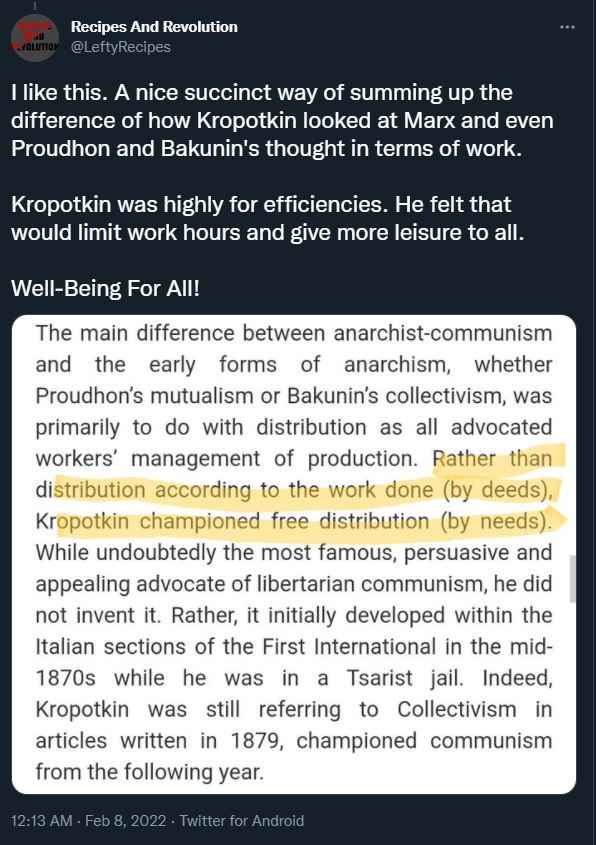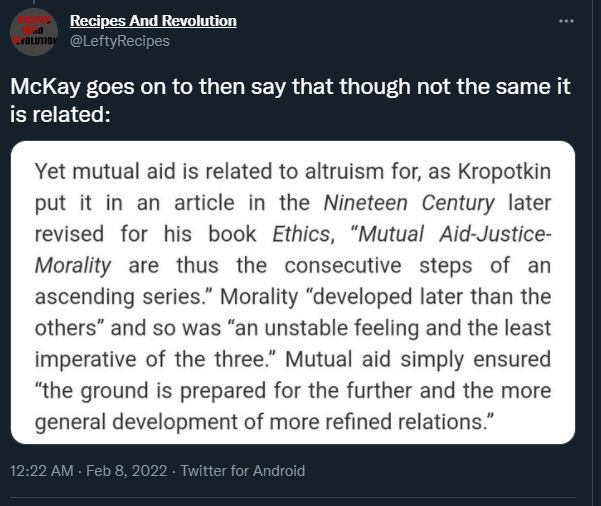READNING NOTES: McKay's "The Legacy of Peter Kropotkin (1842 - 1921)"
Published in June 2021 - 100 years after Kropotkin's death
Notes: PK - Peter Kropotkin, CoB - “The Conquest of Bread”, The Bread Book - “The Conquest of Bread”
This is my notes on my reading of Iain McKay’s piece called “The Legacy of Peter Kropotkin (1842 - 1921)” published in June 2021 just over hundred years after Kropotkin’s death (who’s 101st anniversary is today.
The full piece can be found here: The Legacy of Peter Kropotkin
McKay takes strides, like Ruth Kinna has, to move beyond the “Anarcho-Santa” image that had been placed on the man as he was a true revolutionary and not just all about the Mutual Aid side of things.
PK knows who the enemy is and calls for the workers to rise up. In “The Conquest of Bread”, published in 1892, he writes, “We feel the necessity of a social revolution; rich and poor alike recognize that this revolution is imminent, that it may break out in a very few years.” (C2:P2)
Of course there was revolution in parts of the world since then but we in the west can’t seem to get there.
McKay points out Kropotkin’s thoughts on unions and that the workers need to lead in this revolution in a single purpose: “War on Capitalist Exploitation!”.
Kropotkin championed strikes because he knew the struggle was an economic one and we must hit at capital. Forming committees and political parties will not move us forward because we must look beyond using the tools the capitalists use to keep us down.
In CoB, Peter describes what went wrong in the previous revolutions of that time, mainly The French Revolution (which PK wrote about at great lengths in “The Great French Revolution 1789 - 1793”), the 1848 revolutions that happened all through Europe named “The Springtime of the Peoples”, and, of course, The Paris Commune of 1871.
The first actions of the revolutionaries were to jump into a government that mirrored the ones that the capitalists use. In CoB, he states, “Socialist politicians, radicals, neglected geniuses of journalism, stump orators, middle-class citizens, and workmen hurry to the Town Hall to the Government offices, and take possession of the vacant seats. Some rejoice their hearts with galloon, admire themselves in ministerial mirrors, and study to give orders with an air of importance appropriate to their new position. They must have a red sash, an embroidered cap, and magisterial gestures to impress their comrades of the office or the workshop! Others bury themselves in official papers, trying, with the best of wills, to make head or tail of them.” (C2:P2)
Know thy enemy:
In describing the difference of Kropotkin’s Anarchist-Communism over Proudhon’s Mutualism and Bakunin’s Collectivism (which lines up with Marx’s keeping wage-labor instead of abolishing the wage-system and just taking care of everyone’s needs), McKay write’s, which is a concise way of putting what the difference is. “Rather than distribution according to the work done (by deeds), Kropotkin championed free distribution (by needs):
Anarcho-Communists feel like if you provide “Well-Being For All!” (Chapter 2 of The Bread Book) that, like in times before, people will contribute to what needs to get done. By cutting efficiencies there will be less work needed to be done. Surely once we get rid of all, what David Graeber refers to as, the Bullshit Jobs and not just producing what makes capitalists money but for the needs of the people, there is no need for a wage incentive.
Within McKay’s piece he talks about the difference of mutual aid to altruism but how mutual aid is also related to it:
Mutual Aid works because the people of a community are best to understand their communities needs. In ridding ourselves of competition, we would thrive as communities who work together, for much less time than we do now, leaving us leisure to do what we want.
And, in working together in these communities, we actually see who the true enemy is:






